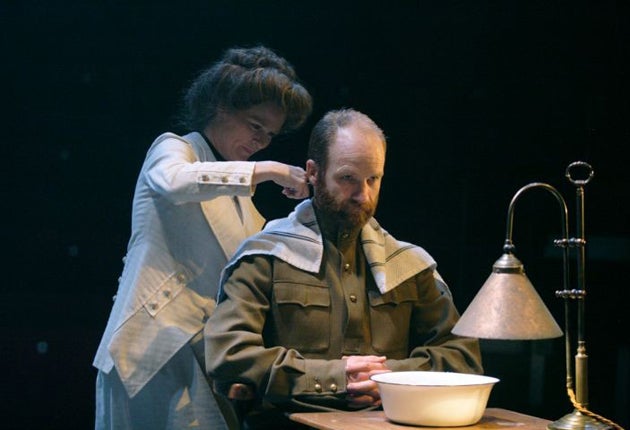The House of Special Purpose, Minerva Theatre, Chichester

Your support helps us to tell the story
From reproductive rights to climate change to Big Tech, The Independent is on the ground when the story is developing. Whether it's investigating the financials of Elon Musk's pro-Trump PAC or producing our latest documentary, 'The A Word', which shines a light on the American women fighting for reproductive rights, we know how important it is to parse out the facts from the messaging.
At such a critical moment in US history, we need reporters on the ground. Your donation allows us to keep sending journalists to speak to both sides of the story.
The Independent is trusted by Americans across the entire political spectrum. And unlike many other quality news outlets, we choose not to lock Americans out of our reporting and analysis with paywalls. We believe quality journalism should be available to everyone, paid for by those who can afford it.
Your support makes all the difference.As the television scriptwriter of Cranford, Heidi Thomas has anatomised damped-down friendships, budding romance and marital "getting along" with some finesse. And her sharp-eyed writing made more than was there, perhaps, of cultural collisions and imminent tragedy.
The same, almost exactly, could be said of her new play, The House of Special Purpose, directed with pinpoint clarity by National Theatre associate Howard Davies. But instead of Victorian provincial women bustling about in bonnets, we have the Tsar of Russia and his doomed Romanov family kicking (and not even clicking) their heels inside an airless "house of special purpose" surrounded by a wooden stockade at Ekaterinberg in the summer of 1918.
Although reference is made, and most poignantly, to the former status of the Romanovs as Nicholas and Alix snuggle up together on a single camp bed, Thomas is really approaching this historical flashpoint from two angles: the "Little Women" side of four sisters on the brink of womanhood; and the detachment of Communist soldiers detailed to take care of them.
Most notably developed out of this is the friendship of the laundryman Yakunin (Kieran Bew) and the Princess Maria (Lydia Wilson). It must always be a matter of idle speculation as to how the Romanovs actually talked to each other in private, and while there's no attempt here to revisit the now discredited myth of Anastasia surviving the bloodbath, designer William Dudley and lighting designer Howard Harrison do combine on a brilliant evocation of those final moments.
We have been lured into forgetting the background in the everyday foreground of small talk, adolescent yearning, glimpses of the future and the shifting, subtle exchanges between the sisters – all of them nicely differentiated if not exactly over-animated by Kate O'Flynn as Anastasia, Caroline Martin as Tatiana and Annabel Scholey as Olga – and the cheerful defiance of their younger, limping brother Alexei (Jonathan Bailey).
Thomas is not a political writer, though, and there are times when you feel that the lack of action and detail in the polemical discussion is working fatally against the effectiveness of the play as a piece of theatre.
To 22 August (01243 781312; www.cft.org.uk)
Join our commenting forum
Join thought-provoking conversations, follow other Independent readers and see their replies
Comments